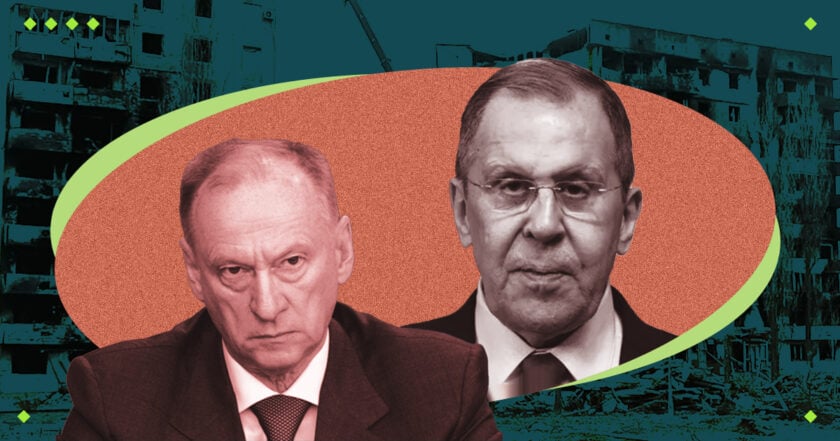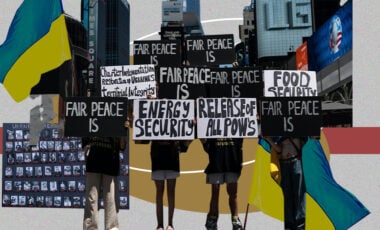Putin's last all-in move, or peace through strength vs. confrontation without peace: How Russia sees peace

The world is entering the "Trump era." This isn't an overly dramatic statement — it's a relatively restrained assessment of what's ahead. We don't exaggerate one person's role in global politics here because the US president is, first and foremost, an institution and only then an individual. Of course, Donald Trump sees it the other way around — he's not willing to limit his role to being just "one of many." His decision to send emissaries to Hollywood like Sylvester Stallone and Mel Gibson signals his intent to intervene in different spheres of public life — and control them where possible.
While Joe Biden warns against the concentration of power and the rise of oligarchy in internal politics, Washington's foreign policy faces equally significant challenges. And it's not just about the Panama Canal, Greenland, or trade disputes with Canada and Mexico. The statements about acknowledging America's strength — "but not unlimited power" — suggest that the US will soon have to confront a major challenge that goes beyond just defining its role and status in the world. Do MAGA supporters still see their country as the sheriff and defender of democracy, or will the promised shift toward "self-interested" politics redefine its role? The answer is still unclear. We sense uncertainty.
Meanwhile, Ukraine has passed the midpoint of winter — the one predicted to be "the hardest in history." So far, it hasn't been that bad, but the second half is still ahead. If you like, Ukraine is at that greasy old glass that's neither full nor empty.
Just like in 2015, Russian forces are less than 10 kilometers from the Dnipropetrovsk region. Just like in 2022, Russia still can strike anywhere in Ukraine, though now it has to appeal to Iran and North Korea for weapons to do so. It still has a considerable advantage in troops and armored vehicles, but OSINT analysts have scraped the bottom of its storage bases and confirmed that visual losses of military equipment have surpassed 20,000 units.
Yet, just as it did three or even ten years ago, Ukraine is still standing — and baring its teeth. It has strengthened its ability to strike deep into Russian territory and has turned the Russian Black Sea Fleet into little more than a coastal ferry service. Russian advances in Donbas continue, but so does Ukraine's presence in the Kursk region. Ukraine's challenges are no greater than Russia's, and the outlook remains equally uncertain. Some American and European politicians — both old and new — are calling for reduced support for Ukraine, but at the same time, Russia's war-driven economic "overheating" isn't doing it any favors either.
Neither side has lost yet. Both still believe in victory, which makes for a terrible backdrop for peace talks. At the same time, Kyiv and Moscow acknowledge that negotiations are inevitable. The only problem? They use the same word — peace — to mean completely different things.
Cards on the table, ace up the sleeve
This brings us back to the earlier point — peace talks are being tied to Trump. Not as part of his flashy campaign promise to end the war in "24 hours," but as an unspoken threat to pressure both sides, one of which may be ready for a deal while the other still needs convincing.
After winning the election, Donald Trump said he wanted to meet with Putin to end the war within six months of taking office. Later, his national security advisor, Mike Waltz, announced a planned phone call "in the coming days or weeks" and preparations for their meeting. The Kremlin gave its usual response, claiming there was no "substantial preparation" for talks — but that's a lie.
Russia started preparing at least by the end of last year, but this preparation was aimed at its own audience. After all, skilled salespeople with empty promises must first figure out how to package their product for the end consumer. In this case, the product is simple: for the average Russian, these talks are only about securing Russia's victory.
The first sign of this strategy came from Alexander Yakovenko, deputy director of Russia Today, a member of the Russian International Affairs Council, and an "extraordinary and plenipotentiary ambassador." He published a massive propaganda piece, which, for some reason, was labeled an "analytical report."
Alongside the usual gems like calling Russia a "unique civilization-state," the West "innately Russophobic," and Ukraine a mere "tool of Western anti-Russian policy," the document contained some revealing details. It outlined Russia's post-war goals, including fixing its new borders, federalizing Ukraine, granting Russia special rights to "maintain constitutional order" in Ukraine, and — just a tiny thing — controlling Ukraine's airspace for the next 20 years. And that was just the beginning of Russia's appetite for more. Soon, other so-called statesmen and "peacemakers" stepped in.
At a press conference — the same one Russia falsely claimed was broadcast on Times Square — Foreign Minister Sergei Lavrov downplayed the war against Ukraine, calling it a secondary issue that could only be addressed after resolving "more significant security concerns." In other words, Russia would only discuss security guarantees for "the country called Ukraine" when it felt like it.
In an interview with Komsomolskaya Pravda, Putin's aide Nikolai Patrushev went even further, calling Russia's occupation of Ukrainian territories the result of "citizens' will, per international law, Russian Federation laws, and local legislation." He then casually suggested that Ukraine might cease to exist altogether by 2025. He also blamed the West for starting the war, claiming it never adjusted to the post-Soviet world and kept looking for enemies.
In his usual arrogant style, the former ever-belligerent Russian President Dmitry Medvedev declared that "the new regions are written into Russia's constitution," so any demand to return them is an attempt to dismantle Russia itself.
Meanwhile, Alexander Bastrykin, head of the Russian Investigative Committee, couldn't resist mentioning the "crimes of the Kyiv regime… committed with weapons mostly of foreign origin" while reporting on his agency's work.
Finally, Kremlin spokesperson Dmitry Peskov jumped in, commenting on a Russian Public Opinion Research Center poll showing that 78% of Russians trust Putin. There's nothing surprising there. He explained this "overwhelming public support" as a direct result of Russia's "successes" in the war.
Compromise without compromise
Let's not disturb George Orwell's eternal rest any further with yet another real-life enactment of his literary genius — you get the idea. So why did these mouthpieces take to the airwaves?
On the one hand, they needed to show the political and societal consensus surrounding their leader, his intentions, and his future decisions. On the other, they wanted to make it clear that the West wouldn't be able to "trick" Russia again — this time, they had taken precautions.
Recently, a respected Western news agency published a supposedly "top-secret" list of demands that Putin insists must be met before he's willing to meet Trump for negotiations. In short, the Kremlin's führer wants:
- Ukraine to never join NATO;
- Ukraine to remain permanently neutral and non-aligned;
- Ukraine's military to be restricted in both troops and equipment;
- Other countries to supply Ukraine only with weapons that cannot be used against Russia or for territorial defense (which essentially means no arms at all);
- Russia to retain complete control over the territories it has seized and annexed.
For all of this to happen, decisions would have to be made not just by foreign governments and international organizations but also through constitutional changes in Ukraine. And this isn't just a case of "demanding the impossible to get what you want" — this is pure pubescent maximalism in the body of an aging dictator. The goal is to humiliate the other side, no matter how many parties are at the negotiating table.
After all, forcing Ukraine into a de facto surrender wouldn't just look like a victory for Russia — it would be a victory by every definition. Strip away all the layers, and what's left is territorial expansion and the world's tacit agreement to accept it as a done deal. Then the Kremlin can funnel trillions of rubles into AI, neural networks, and the wild experiments of Putin's personal banker, Yury Kovalchuk, hoping that one of them will allow Putin to upload his consciousness into a digital body and rule forever. Not as some worm-like God-Emperor from Dune, but as the perfect machine-human entity, crushing all opposition. Tyrants have sent armies to their deaths for far less.
Whenever Ukraine strikes a Russian target, Russian propagandists demand "the harshest retaliation." The implication is that Moscow still has some kind of military "trump card" that it has refrained from using — out of either strategic restraint or supposed generosity. Russian users on American social media, hiding behind VPNs, parrot this message, warning of "lost patience" and "inevitable retribution."
In reality, Russia has no hidden superweapons left. It won't dare use nukes, and the much-hyped Oreshnik system turned out to be so underwhelming that even the most fanatical warmongers have stopped mentioning it. Of course, thanks to North Korean troops and material support, the front line is slowly inching toward the Dnipro River, but brute force alone won't be enough. The window of opportunity is closing, so the Kremlin has no choice but to pretend everything is going according to plan while raising the stakes to the extreme.
During Russia's latest attack on Ukraine on January 15, Norwegian F-35s were deployed into Polish airspace for the first time. NATO's Air Command called this a demonstration of the Alliance's "commitment to the eastern flank." Here in Ukraine, it became yet another meme.
Indeed, we, Ukrainians, deserve more than symbolic gestures of solidarity and the illusion of decisive action. And yet, we keep forgetting that no one actually owes us anything. We might not realize that we are witnessing the slowest mobilization in European history, which will eventually end in a rapid, decisive push forward.
The key is to hold on long enough to see it happen.

















































